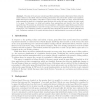Free Online Productivity Tools
i2Speak
i2Symbol
i2OCR
iTex2Img
iWeb2Print
iWeb2Shot
i2Type
iPdf2Split
iPdf2Merge
i2Bopomofo
i2Arabic
i2Style
i2Image
i2PDF
iLatex2Rtf
Sci2ools
CEAS
2004
Springer
2004
Springer
Personalised, Collaborative Spam Filtering
The state of the art sees content-based filters tending towards collaborative filters, whereby email is filtered at the MTA with users feeding information back about false positives and negatives. While this improves the ability of the filter to track concept drift in spam over time, such approaches make assumptions implicit in centralised spam filtering, such as that all users consider the same email to be spam. In this paper, we detail and analyse these assumptions and describe how they affect spam filtering. We present an architecture for personalised, collaborative spam filtering and describe the design and implementation of proof-of-concept, peer-to-peer, signature-based system based on the architecture. The evaluation is based on real-world users employing the system as their spam-filtering tool. Preliminary analysis of the results indicates that the implementation is accurate and efficient.
Related Content
| Added | 01 Jul 2010 |
| Updated | 01 Jul 2010 |
| Type | Conference |
| Year | 2004 |
| Where | CEAS |
| Authors | Alan Gray, Mads Haahr |
Comments (0)

